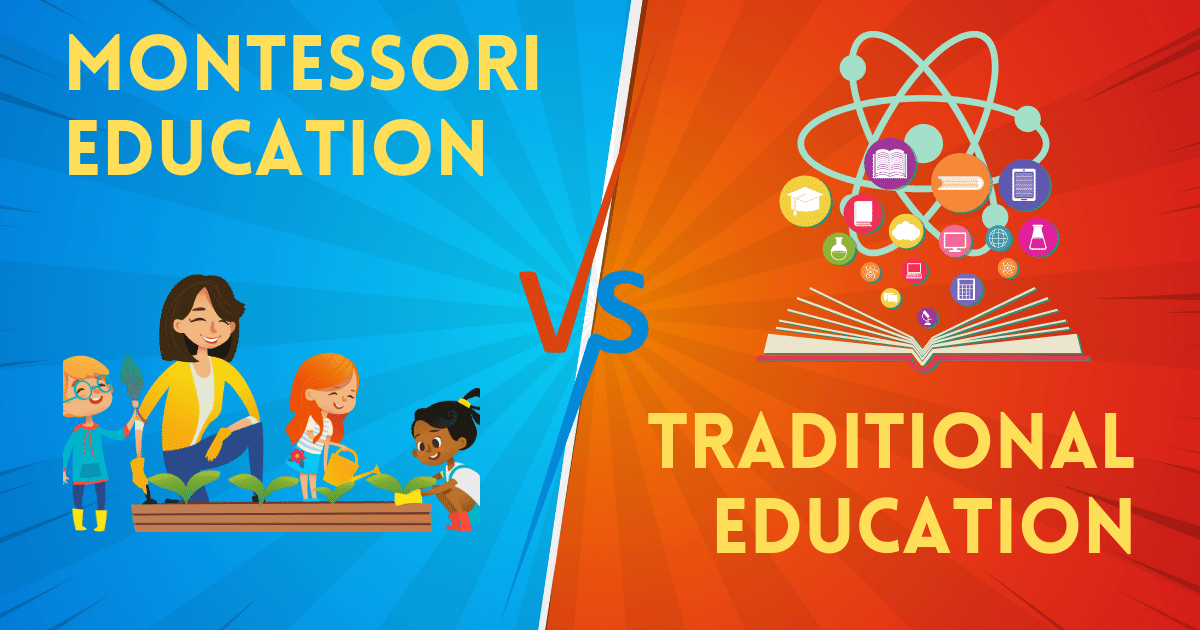Montessori Education
Montessori education is a child-centered approach that emphasizes hands-on learning and self-directed activity. It was developed by Maria Montessori, an Italian physician, and educator, in the early 1900s.
Montessori schools are typically characterized by:
- Mixed-age classrooms: Students of different ages learn together, which can foster peer learning and cooperation.
- Self-directed learning: Students are given the freedom to choose their activities and learn at their own pace.
- Hands-on learning: Students learn through hands-on experiences with concrete materials.
- Play-based learning: Play is seen as an essential part of learning, and children are encouraged to play and explore.
- Independence: Students are encouraged to be independent and to take responsibility for their learning.
In addition to these characteristics, Montessori schools also typically have a strong emphasis on:
- Respect for the child: Montessori believed that children should be treated with respect and that their individual needs should be taken into account.
- Observation: Montessori teachers are trained to observe children to understand their learning styles and needs.
- Collaboration: Montessori schools encourage collaboration between students, teachers, and parents.
Montessori schools can be found in many countries around the world, and they vary in their specific practices and philosophies. However, the core principles of Montessori education remain the same.
Read More Articles:
Cognitive Learning: Exploring the Mental Processes of Knowledge Acquisition
The Brain Study Informally: A Journey into the Human Mind
Traditional Education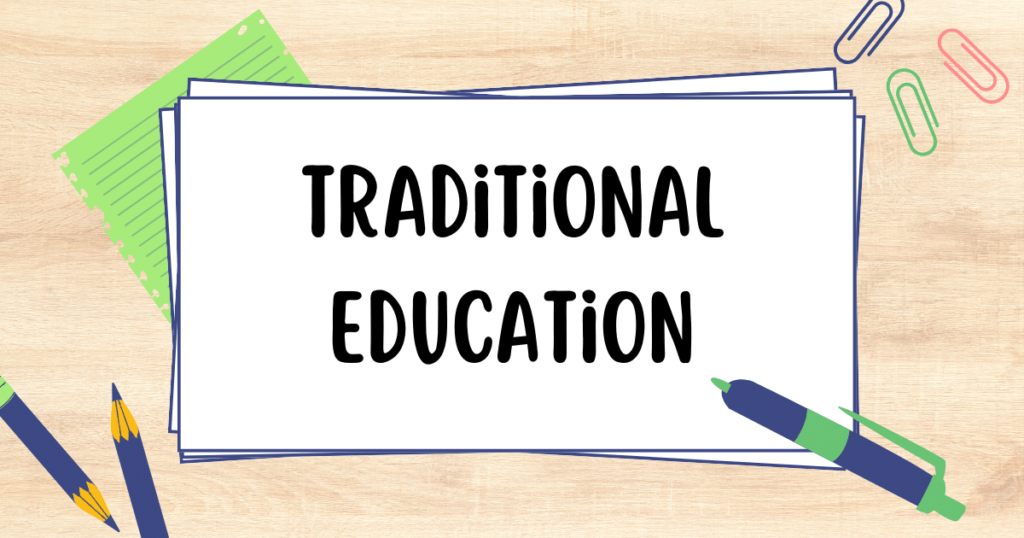
Traditional education is a teacher-centered approach that emphasizes academic learning and direct instruction. It is the most common type of education in the United States and worldwide.
Characteristics of Traditional Education
- Age-graded classrooms: Students of the same age are grouped in classrooms.
- Teacher-directed learning: The teacher is the primary source of information, and students are expected to listen and follow instructions.
- Academic learning: The focus is on educational subjects such as math, reading, and science.
- Rote learning: Students are often expected to memorize facts and information.
- Competition: Students are often graded against each other, creating a competitive environment.
Strengths of Traditional Education
- Structured and organized: Traditional education provides a structured and organized learning environment, which can benefit students who need clear expectations and guidance.
- Focus on academic achievement: Traditional education strongly emphasizes academic achievement, which can prepare students for success in higher education and the workforce.
- Teacher expertise: Traditional teachers are typically experts in their subject area and can help students gain a deep understanding of the material.
Weaknesses of Traditional Education
- Can be inflexible: Traditional education can be rigid and may only meet the needs of some learners. Students who learn differently or at a different pace may need help in a traditional setting.
- Limited opportunities for hands-on learning: Traditional education often focuses on rote learning and memorization, and students may have limited opportunities to engage in hands-on learning and exploration.
- Can be competitive: The emphasis on grades and competition in traditional education can create a stressful and competitive environment for students.
Traditional education has a long history and has successfully educated generations of students. However, it is important to be aware of its strengths and weaknesses so that you can make an informed decision about the best educational approach for your child.
Montessori Education vs. Traditional Education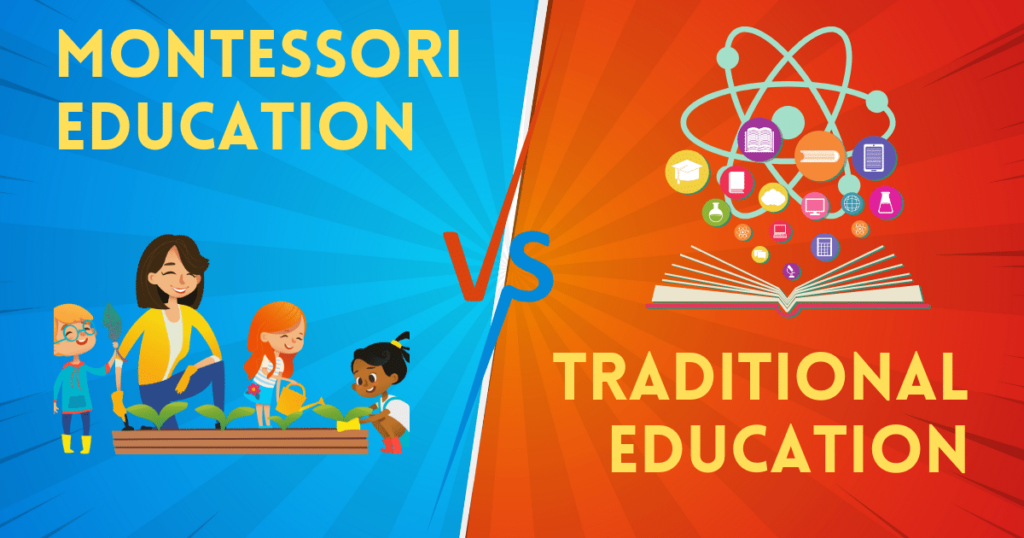
Definition:
- Montessori Education: A child-centered approach to teaching and learning that emphasizes hands-on learning and self-directed activity.
- Traditional Education: A teacher-centered approach that emphasizes academic learning and direct instruction.
Key Principles:
Montessori Education:
- Respect for the child
- Observation
- Prepared environment
- Self-directed learning
- Hands-on learning
- Play-based learning
- Mixed-age classrooms
- Collaboration
Traditional Education:
- Emphasis on academic achievement
- Teacher-directed instruction
- Age-graded classrooms
- Rote learning
- Competition
Similarities:
- Both aim to educate children.
- Both involve teachers and students.
- Both use a variety of teaching methods.
Differences:
Montessori Education
- Focus on the individual child and their development.
- Encourages self-directed learning and exploration.
- Emphasizes hands-on, experiential learning.
- Uses mixed-age classrooms to foster peer learning.
- Values play and creativity as essential elements of learning.
Traditional Education
- Focus on academic content and subject matter.
- Teacher-centered, with students receiving direct instruction.
- Emphasizes rote learning and memorization.
- Uses age-graded classrooms to group students by age.
- May prioritize competition and standardized testing.
Benefits:
Montessori Education
- Cognitive development: Problem-solving, critical thinking, and creativity.
- Social and emotional development: Independence, cooperation, and self-confidence.
- Physical development: Coordination, balance, and fine motor skills.
- Love of learning: Fosters a lifelong passion for knowledge.
Traditional Education
- Academic achievement: Prepares students for higher education and careers.
- Teacher expertise: Provides students with access to subject matter experts.
- Structure and organization: Offers a clear and predictable learning environment.
Drawbacks:
Montessori Education
- Can be expensive.
- May not be widely available.
- May not be suitable for all children, especially those who need more structure and support.
Traditional Education
- Can be inflexible and may not meet the needs of all learners.
- Limited opportunities for hands-on learning and exploration.
- A competitive environment can be stressful for some students.
Montessori education and traditional education are two distinct approaches to teaching and learning. Both have their unique strengths and weaknesses, and the best approach for a particular child will depend on their individual needs and learning styles.
Comparison of Montessori and Traditional Education
The following table compares Montessori and traditional education on several key dimensions:
| Dimension | Montessori Education | Traditional Education |
| Approach | Child-centered | Teacher-centered |
| Learning environment | Mixed-age classrooms, hands-on learning, play-based learning | Age-graded classrooms, teacher-directed learning, academic learning |
| Role of the teacher | Guide and facilitator | Instructor and authority figure |
| Role of the student | Active learner, self-directed | Passive learner follows instructions |
| Emphasis | Independence, creativity, problem-solving | Academic achievement, rote learning, competition |
Which Approach is Right for Your Child?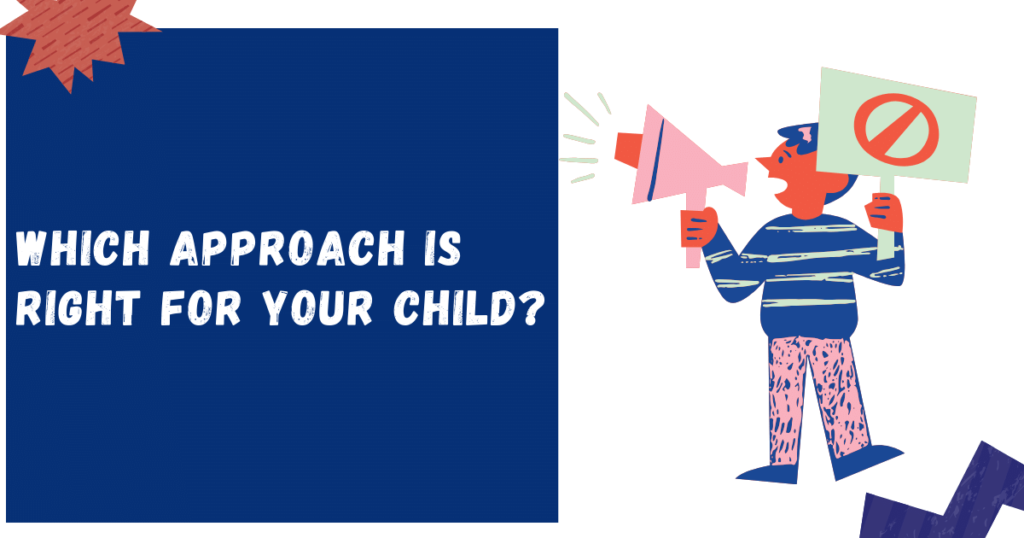
The best approach to education for a particular child will depend on their needs and learning style. Some children may thrive in a Montessori environment, while others may do better in a traditional school setting.
Here are some factors to consider when choosing between Montessori and traditional education:
- Your child’s personality: Montessori education is well-suited for independent, self-motivated, and creative children. Traditional education may better fit children who prefer to learn in a more structured environment.
- Your child’s learning style: Montessori education emphasizes hands-on learning and self-directed activity. Traditional education typically involves more teacher-directed instruction and rote learning. Choose the approach that best aligns with your child’s learning style.
- Your family’s values: Montessori education strongly emphasizes independence, creativity, and problem-solving. Traditional education typically focuses more on academic achievement and competition. Consider which values are most important to you and your family.
If you are considering Montessori education for your child, visiting a Montessori school and talking to the teachers to learn more about the approach is essential. You should also consider your child’s personality and learning style to see if Montessori is a good fit.
Ultimately, choosing Montessori or traditional education is a personal decision. There is no right or wrong answer, and the best approach will vary from child to child.
Here are some additional questions to ask yourself when making your decision:
- What are your child’s strengths and weaknesses?
- What are your child’s interests?
- What kind of learning environment do you think your child would thrive in?
- What are your educational goals for your child?
Once you have considered all of these factors, you can decide which approach to education is right for your child.
If you are considering Montessori education for your child, visiting a Montessori school and talking to the teachers to learn more about the approach is essential. You should also consider your child’s personality and learning style to see if Montessori is a good fit.
Ultimately, choosing Montessori or traditional education is a personal decision. There is no right or wrong answer, and the best approach will vary from child to child.
Traditional teaching methods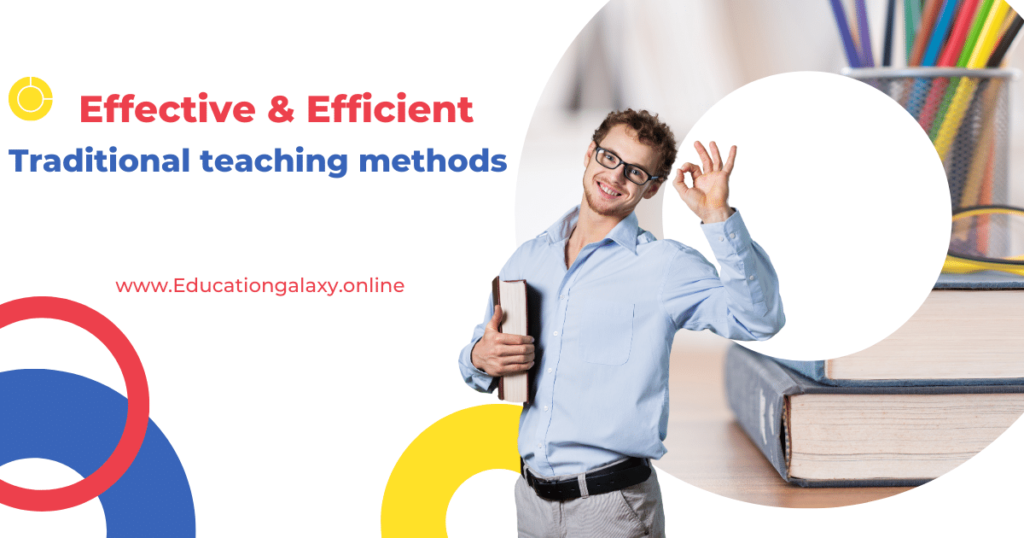
Traditional teaching methods are instructional practices that have been used for many years and are still widely used in schools today. These methods typically involve the teacher delivering instruction to a group of students, with students listening and taking notes. Traditional teaching methods include:
- Lecture: The teacher delivers a prepared speech to the students, who listen and take notes.
- Recitation: Students are asked to recall and recite information that they have been taught.
- Drill and practice: Students are given repeated practice on a skill or concept.
- Textbook instruction: Students read and study a textbook to learn new information.
- Homework: Students are given assignments to complete outside of class.
Traditional teaching methods can be effective for teaching some types of content, such as factual information or basic skills. However, they can be less effective in teaching higher-order thinking skills, such as critical thinking and problem-solving.
Advantages of traditional teaching methods:
- Structured and organized: Traditional teaching methods provide a structured and organized learning environment.
- Efficient: Traditional teaching methods can be efficient for delivering large amounts of information to a group of students.
- Familiar: Traditional teaching methods are familiar to most students and teachers.
Disadvantages of traditional teaching methods:
- Passive: Traditional teaching methods can be passive, with students listening and taking notes rather than actively participating in the learning process.
- Not individualized: Traditional teaching methods do not always allow for individualization of instruction.
- Can be boring: Traditional teaching methods can be boring for some students.
Overall, traditional teaching methods can be effective for teaching some types of content, but they are not always the best approach for all students or all learning objectives. Teachers should use a variety of teaching methods to meet the needs of their students and to achieve their learning objectives.
FAQs
What is Montessori education?
Montessori education is a child-centered approach to teaching and learning that emphasizes human learning and self-directed activity. It is based on the belief that children learn best through exploration and play. Montessori classrooms are typically mixed-age, and students are encouraged to learn at their own pace.
What is traditional education?
Traditional education is a teacher-centered approach that emphasizes academic learning and direct instruction. It is based on the belief that children learn best through structured lessons and rote memorization. Traditional classrooms are typically age-graded, and students are expected to learn at a predetermined pace.
What are the benefits of Montessori education?
Montessori education has many benefits, including:
- Cognitive development: Problem-solving, critical thinking, and creativity.
- Social and emotional development: Independence, cooperation, and self-confidence.
- Physical development: Coordination, balance, and fine motor skills.
- Love of learning: Fosters a lifelong passion for knowledge.
What are the benefits of traditional education?
Traditional education also has many benefits, including:
- Academic achievement: Prepares students for higher education and careers.
- Teacher expertise: Provides students with access to subject matter experts.
- Structure and organization: Offers a clear and predictable learning environment.
Which approach is right for my child?
The best approach to education for a particular child will depend on their individual needs and learning style. Some children may thrive in a Montessori environment, while others may do better in a traditional school setting.
How do I choose between Montessori and traditional education?
When choosing between Montessori and traditional education, parents should consider the following factors:
- Their child’s individual needs and learning style.
- The cost of Montessori schools.
- The availability of Montessori schools in their area.
- The class size and teacher qualifications at Montessori schools.
Is Montessori education more expensive than traditional education?
Montessori schools can be more expensive than traditional schools. However, the cost of Montessori education varies depending on the school and the location.
Are Montessori schools available in all areas?
Montessori schools may not be available in all areas. However, the number of Montessori schools is growing.
Are Montessori teachers qualified?
Montessori teachers must have specialized training. Montessori teacher training programs are accredited by the Montessori Accreditation Council for Teacher Education (MACTE).
Can my child switch from Montessori to traditional education or vice versa?
Yes, children can switch from Montessori to traditional education or vice versa. However, it is important to note that the transition may be easier for some children than for others.
Conclusion
Montessori education and traditional education are two distinct approaches to teaching and learning. Both have their unique strengths and weaknesses, and the best approach for a particular child will depend on their individual needs and learning styles.
Montessori education is a child-centered approach that emphasizes hands-on learning and self-directed activity. It is based on the belief that children learn best through exploration and play. Montessori classrooms are typically mixed-age, and students are encouraged to learn at their own pace.
Traditional education is a teacher-centered approach that emphasizes academic learning and direct instruction. It is based on the belief that children learn best through structured lessons and rote memorization. Traditional classrooms are typically age-graded, and students are expected to learn at a predetermined pace.
There is no one-size-fits-all approach to education. The best approach for a particular child will depend on their individual needs and learning style. Some children may thrive in a Montessori environment, while others may do better in a traditional school setting.
Ultimately, the decision of whether to choose Montessori or traditional education is a personal one. Parents should carefully consider the strengths and weaknesses of each approach and make the decision that they believe is best for their child.
Additional Considerations
In addition to the strengths and weaknesses discussed above, parents may also want to consider the following factors when making their decision:
- Cost: Montessori schools can be more expensive than traditional schools.
- Availability: Montessori schools may not be available in all areas.
- Class size: Montessori classrooms are typically smaller than traditional classrooms.
- Teacher qualifications: Montessori teachers must have specialized training.
Parents should also visit both Montessori and traditional schools and talk to the teachers and administrators to get a better understanding of each approach. By doing their research, parents can make an informed decision about the best educational setting for their child.


